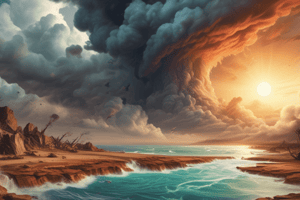Podcast
Questions and Answers
What happens when the soil, dams, wetlands, and rivers cannot absorb all the rain?
What happens when the soil, dams, wetlands, and rivers cannot absorb all the rain?
- The rainwater gets stored underground
- A drought occurs
- The water evaporates quickly
- A flood happens (correct)
What is the major natural cause of floods?
What is the major natural cause of floods?
- Cyclones
- Storm surges
- Earthquakes
- Heavy rainfall (correct)
How can human activities contribute to flooding?
How can human activities contribute to flooding?
- By altering the environment, reducing its ability to handle heavy rainfall (correct)
- By reducing the amount of rainfall
- By building dams to store water
- By reducing the number of cyclones
What can be a consequence of flooding on a large scale?
What can be a consequence of flooding on a large scale?
What type of natural disaster can cause flooding on a very big scale?
What type of natural disaster can cause flooding on a very big scale?
What is a common disease that can occur after floods due to damage to water supplies and sewage systems?
What is a common disease that can occur after floods due to damage to water supplies and sewage systems?
What can happen to the roots of plants when the soil becomes waterlogged due to excessive rain?
What can happen to the roots of plants when the soil becomes waterlogged due to excessive rain?
What is a result of floods that can lead to people looking for new places to live and work?
What is a result of floods that can lead to people looking for new places to live and work?
What can cause the water to flow away along indentations or trails on the surface, leading to soil erosion?
What can cause the water to flow away along indentations or trails on the surface, leading to soil erosion?
What can happen to buildings when floodwaters move with great force?
What can happen to buildings when floodwaters move with great force?
Study Notes
What is a Flood?
- A flood occurs when rain falls faster than the soil, dams, wetlands, and rivers can absorb it, resulting in water flowing into areas that are normally dry.
Causes of Floods
Natural Causes
- Heavy rainfall is the major natural cause of floods, where watercourses cannot carry away the excess water, leading to rising water levels in rivers and dams.
Environmental Causes
- Human activities have altered the environment, making it unable to cope with heavy rainfall, leading to floods.
- Examples of environmental causes include:
- Farming
- Settlements
- Storm surges
Disasters
- Cyclones, hurricanes, and tsunamis can cause flooding on a large scale.
- Earthquakes can cause dams to break, leading to flooding.
Effects of Floods
On People
- Injuries and loss of life due to fast-moving and rising floodwaters that can destroy homes and drown people.
- Increase in diseases, particularly cholera, due to damage to water supplies and sewage systems.
- Displacement, where people lose their homes and have to find new places to live and work.
On Land
- Soil erosion, where heavy rainfall can create rivulets and gullies.
- Crop destruction, where too much rain can cause soil waterlogging, leading to root rot and plant death.
On Buildings and Infrastructure
- Destruction of buildings, as floodwaters can wash them away with great force.
- Damage to infrastructure, costing millions of rand and negatively affecting economic development in countries.
Studying That Suits You
Use AI to generate personalized quizzes and flashcards to suit your learning preferences.
Description
This quiz explores the devastating effects of floods on human life, including injuries, loss of life, and disease outbreaks, as well as the environmental impact on soil and land.




